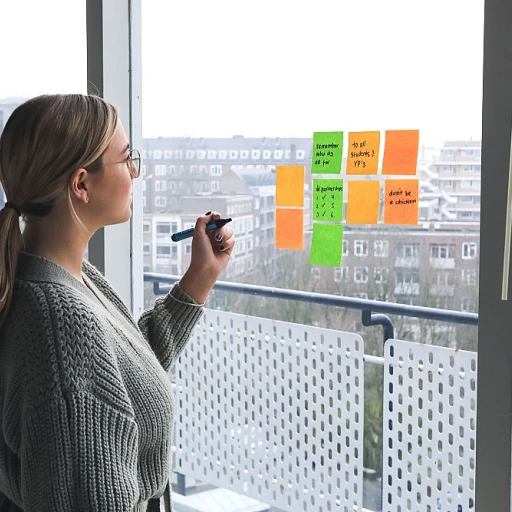
Understanding AI's Role in Employee Development
AI as a Catalyst in the Evolution of Employee Development
The integration of artificial intelligence (AI) into employee development has revolutionized the way organizations approach coaching and mentoring. It is reshaping traditional frameworks by providing data-driven insights that promote personalized learning experiences, driving enhanced employee engagement and improved performance outcomes.
AI-driven tools analyze vast amounts of data, offering a nuanced understanding of an employee's strengths, weaknesses, and areas requiring development. By leveraging this capability, organizations can design personalized learning paths that match individual skill sets and growth potentials. The precision of AI allows for real-time feedback, which is crucial in fostering ongoing learning and ensuring that coaching leadership is both relevant and effective.
In an era where employee performance is pivotal to organizational success, AI enables a more holistic view of talent development. It facilitates the identification of leadership potential within the workforce, thus streamlining the management's capacity to nurture future leaders. Additionally, by aligning developmental goals with the company's strategic objectives, AI enhances performance management practices.
Employee development is not just about professional skills; it involves creating an environment where employees can thrive both mentally and physically. AI tools contribute to this by encouraging behavior change that focuses not only on technical competencies but also on maintaining physiological health and emotional well-being.
Adoption of AI in employee development, however, is not devoid of challenges. Organizations may face resistance due to concerns about data privacy and the impersonal nature of AI interactions. Yet, when appropriately addressed, these concerns can be mitigated, leading to successful adoption of AI initiatives.
Hone's Approach to AI Coaching
Hone's AI-Driven Approach to Employee Development
Hone has become a trailblazer in leveraging artificial intelligence to revolutionize employee coaching and development. The platform employs advanced AI algorithms to deliver targeted and personalized learning experiences that adapt to an individual employee's strengths and areas for growth. To achieve impactful employee performance enhancement, Hone's approach centers around several core elements:- Data-Driven Insights: Using analytics, Hone gathers data on employee engagement and performance, enabling a more accurate assessment of development needs. By harnessing real-time feedback, their AI tools offer insights into both immediate and long-term improvement areas.
- Personalized Learning Paths: One of the distinguishing features of Hone's AI coaching is its capacity to craft personalized learning paths. These paths are designed based on employees' unique learning styles, preferences, and career goals, optimizing the learning curve and augmenting employee engagement.
- Seamless Integration with Existing Systems: Utilizing AI, Hone integrates seamlessly into an organization's existing human resources infrastructure, aligning with current performance management and training programs. This minimizes disruptions and encourages easier adoption.
- Enhanced Leadership Development: The precision of AI coaching tools specifically benefits leadership development by identifying potential leaders within the workforce and nurturing their talent development with targeted coaching leadership programs.
Benefits of AI Coaching for Employees
Unleashing Potential through AI Coaching
In the realm of employee development, AI coaching offers a transformative approach, reshaping how organizations foster talent and enhance employee engagement. By utilizing data-driven insights, AI tools provide personalized learning paths that align with individual strengths and areas for improvement, ensuring meaningful development experiences.
Through real-time feedback, AI coaching supports continuous learning and behavior change, enhancing employee performance. It integrates seamlessly with existing performance management systems, making it a valuable addition to leadership development programs. Employees benefit from targeted coaching leadership, helping them refine their skills and improve performance reviews.
Moreover, AI coaching expedites the adoption of new training programs by offering personalized learning experiences, rewarding employees with quicker results. This data-driven approach not only accelerates learning development but also improves the overall effectiveness of training sessions, optimizing the time spent on employee training.
Ultimately, AI coaching empowers employees to take control of their own development journey, promoting physical health and fostering both professional and personal growth. This forward-thinking tool represents a significant advancement in talent development, setting new benchmarks for employee development initiatives.
Challenges in Implementing AI Coaching
Challenges to Overcome with AI Coaching Integration
Integrating AI coaching into employee development presents a series of challenges for organizations keen on harnessing its potential. While the promise of enhanced performance and personalized learning experiences is alluring, several factors need to be diligently managed to achieve successful integration. First and foremost, the adoption of AI-driven coaching tools requires a cultural shift within organizations. Embracing technology for employee development and learning paths might not come naturally to all, and leadership must foster a supportive environment. Strong change management practices are essential to ensure that employees feel comfortable and engaged with AI-based systems. Another significant hurdle is the collection and utilization of data. While organizations possess a wealth of data, extracting actionable insights for personalized coaching requires sophisticated data management systems. Ensuring data privacy and transparency is critical, as employees need to trust the systems that guide their learning and development. Employee readiness and acceptance also play a crucial role. Career development is a deeply personal journey, and many may harbor reservations about receiving feedback from AI as opposed to human coaches. Providing transparency about the role of AI in performance reviews and employee engagement can help mitigate these concerns. Technical integration poses its own set of challenges, especially when older systems are in place. Organizations must evaluate their infrastructure and invest in the necessary technology to support AI coaching tools effectively. This may include upskilling IT teams or bringing in specialized talent. Lastly, aligning AI coaching with existing training programs and leadership development initiatives requires strategic planning. Ensuring consistency between current learning paths and AI-driven feedback mechanisms can enhance the overall employee development experience. While these challenges are daunting, they are not insurmountable. With a carefully crafted approach, organizations can harness AI coaching to drive significant improvements in employee performance and talent development.Case Studies: Success Stories with Hone
Proven Success with Hone's AI Coaching
As organizations worldwide increasingly prioritize employee development, several have already experienced remarkable success stories by integrating AI coaching tools like those provided by Hone. These examples not only highlight the positive impact of AI on performance management and employee engagement but also underscore the transformative potential of data-driven coaching strategies. One such organization successfully harnessed Hone's AI-driven coaching to enhance leadership development among their mid-level managers. The tailored learning paths and real-time feedback mechanisms allowed these individuals to cultivate essential leadership skills more effectively, thus leading to improved employee performance and engagement. The personalized learning experiences provided by Hone helped align coaching with each manager's unique development goals, paving the way for meaningful behavior change and leadership growth. In another case, a company focused on augmenting their talent development initiatives through AI coaching. By adopting cutting-edge training programs embedded with AI capabilities, the organization created personalized coaching plans for their teams. The result was a noticeable increase in employee engagement and a culture of continuous learning, demonstrating the effectiveness of blending technology with traditional coaching leadership methods. Despite these successes, it’s important to consider the challenges of AI adoption in organizational settings, such as data integration and change management. However, as further illustrated in previous discussions, the benefits and potential of AI in employee development continue to grow, positioning tools like Hone as valuable assets in modern talent development strategies.Future Trends in AI and Employee Development
Emerging Trends in AI-Driven Employee Development
The landscape of employee development is rapidly evolving, with artificial intelligence playing a pivotal role in shaping future trends. As organizations continue to seek innovative ways to enhance employee performance and engagement, several key trends are emerging in the realm of AI-driven development.
Personalized Learning Experiences
One of the most significant trends is the shift towards personalized learning experiences. AI tools are increasingly being used to tailor learning paths to individual employees, taking into account their unique skills, performance data, and career goals. This personalized approach not only enhances employee engagement but also ensures that training programs are more effective and aligned with organizational objectives.
Real-Time Feedback and Performance Management
Another trend is the integration of real-time feedback mechanisms into performance management systems. AI-driven platforms are enabling managers to provide instant feedback, fostering a culture of continuous improvement and development. This real-time feedback loop is crucial for driving behavior change and improving employee performance over time.
Data-Driven Talent Development
Data-driven decision-making is becoming a cornerstone of talent development strategies. By leveraging AI, organizations can analyze vast amounts of data to identify trends, predict future skills needs, and tailor leadership development programs accordingly. This data-driven approach ensures that talent development initiatives are both strategic and impactful.
AI in Leadership Development
AI is also making strides in the area of leadership development. Coaching leadership programs are being enhanced with AI tools that provide personalized feedback and insights, helping leaders to refine their skills and improve their effectiveness. This trend is particularly important as organizations look to develop the next generation of leaders in an increasingly complex business environment.
Challenges and Opportunities
While the potential of AI in employee development is immense, organizations must also navigate several challenges. These include ensuring data privacy, managing the adoption of new technologies, and addressing potential biases in AI-driven systems. However, with careful management and strategic planning, the opportunities far outweigh the challenges, paving the way for a future where AI plays a central role in employee development.













